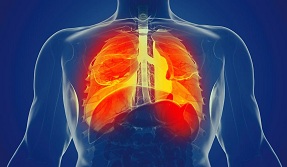COVID Research News: Swedish Researchers Discover That Liquid Gel in COVID-19 Patients' Lungs Is Hyaluronan
Source: COVID Research News Oct 08, 2020 5 years, 2 months, 1 week, 5 days, 3 hours, 43 minutes ago
COVID Research News: Swedish researchers from Umea University in a new detailed study have now established what the active agent in the jelly like substance often found in the lungs of COVID-19 patients is.

It was found that in most patients who had died with severe COVID-19 and respiratory failure, a jelly was formed in the lungs. The formation of the jelly in the lungs of COVID-19 patients often leads to a worsening of respiratory issues and other bodily conditions.
Severe COVID-19 disease is characterized by inflammation of the lungs with increasing respiratory impairment. In fatal COVID-19, lungs at autopsy have been found to be filled with a clear liquid jelly. However, the nature of jelly has not yet been determined. The aim of the study was to demonstrate if the lungs of fatal COVID-19 contain hyaluronan (HA) as it is associated with inflammation and acute respiratory distress syndrome (ARDS) and may have the appearance of liquid jelly. Lung tissue obtained at autopsy from three deceased Covid-19 patients was processed for hyaluronan histochemistry using a direct staining method and compared with staining in normal lung tissue.
Stainings confirmed that hyaluronan was obstructing alveoli with presence in exudate and plugs, as well as in thickened perialveolar interstitium. In contrast, normal lungs only showed hyaluronan in intact alveolar walls and perivascular tissue.
This is the first study to confirm prominent hyaluronan exudates in the alveolar spaces of Covid-19 lungs, supporting the notion that the macromolecule is involved in ARDS caused by SARS-CoV-2.
The present finding may open up for new treatment options in severe Covid-19, aiming at reducing the presence and production of hyaluronan in the lungs.
The research findings were published in the Journal of Biological Chemistry
https://www.jbc.org/content/early/2020/09/25/jbc.AC120.015967
To date there are already therapies that either slow down the body's production of this jelly or breaks down the jelly through an enzyme.
Dr Urban Hellman, researcher from Umeå University told Thailand medical News, “Interestingly, our findings can also explain why cortisone seems to have an effect on COVID-19."
Typically when performing lung scans on critically ill patients with COVID-19 infection, medical professionals have been able to see white patches.
Furthermore the autopsies of some deceased COVID-19 patients have shown that the lungs were filled with a clear liquid jelly, much resembling the lungs of someone who has drowned. It was previously unknown where this jelly originated from.
The Swedish study team has now shown that the jelly consists of the substance hyaluronan, which is a polysaccharide in the glycosaminoglycan group.
It should be known that the presence of hyaluronan is normal in the human body, with various functions in different tissues, but it generally acts as a useful characteristic in the connective tissue. Not least, hyaluronan is involved in the early stages of wound healing.
Hyaluronan is also produced synthetically in the bea
uty industry for lip augmentation and anti-wrinkle treatments.
As hyaluronan can bind large amounts of water in its web of long molecules, it forms a jelly-like substance. And it is this process that runs riot in the alveoli of COVID-19 patients' lungs resulting in the patient needing ventilator care and, in worst case, dies from respiratory failure.
The study team found that currently a drug called Hymecromone is used to slow down the production of hyaluronan in other diseases such as gallbladder attacks. There is also an enzyme that can effectively break down hyaluronan. As an example, this enzyme can be used in the event that an unsuccessful beauty treatment needs to be terminated abruptly.
Importantly even cortisone reduces the production of hyaluronan.
Already a past British study, preliminary data shows positive effects on treatments with the cortisone drug Dexamethasone in severely ill COVID-19 patients.
https://www.medrxiv.org/content/10.1101/2020.06.22.20137273v1
The study team said, "It has previously been assumed that the promising dexamethasone preliminary results would be linked to the general anti-inflammatory properties of cortisone, but in addition to those beliefs, cortisone may also reduce the production of hyaluronan (HA), which may reduce the amount of jelly in the lungs.”
Another suggested option is the clinical use of 4‐ methylumbelliferone (4-MU), which can inhibit the production of HA in inflammation, autoimmunity and cancer.
https://www.nature.com/articles/s41418-020-0530-3
And
https://www.frontiersin.org/articles/10.3389/fimmu.2015.00123/full
4-MU both inhibits the gene expression of two HA synthases (HAS2 and HAS3) and blocks the last stage in the formation of HA from glucose metabolites.
https://www.nature.com/articles/bjc2011459
This substance, or its chemical derivatives, is already used in TCM Chinese medicine, which may explain the observed positive effects of combined herbal therapies in some COVID-19 patients. In clinical trials, however, not including Covid-19 patients, 4-MU has been demonstrated safe during short-term administration in approved doses.
This compound is also found in Thailand Medical News Therapeutic Teas.
https://www.thailandmedical.news/news/new-therapeutic-teas-
The study team concluded, “We have for the first time demonstrated a striking presence of hyaluronan in alveolar spaces of the lungs in lethal cases of COVID-19. Based on this novel finding, adjuvant treatment targeting hyaluronan may be a promising approach to reduce mortality in critically ill COVID-19 patients. However, clinical randomized trials are warranted to evaluate the safety and efficacy of these substances in the case of severe COVID-19.”
For more
COVID Research News, keep on logging to Thailand Medical News.
